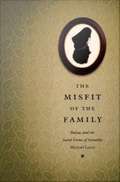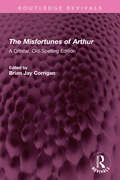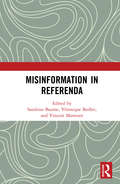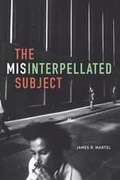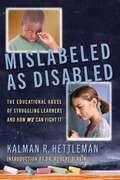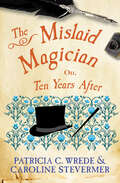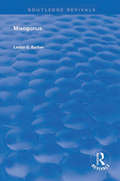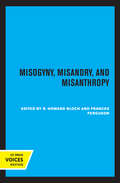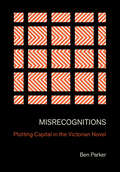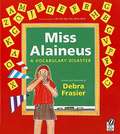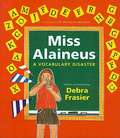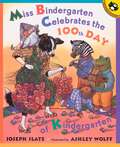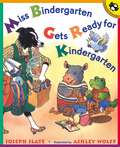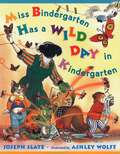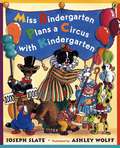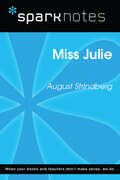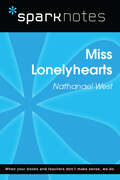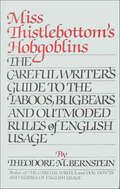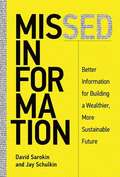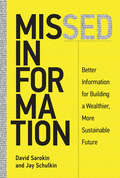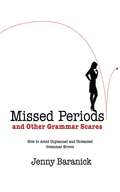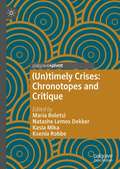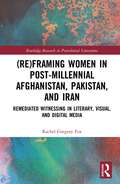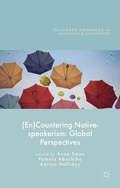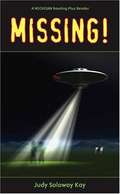- Table View
- List View
The Misfit of the Family: Balzac and the Social Forms of Sexuality
by Michael LuceyIn more than ninety novels and novellas, Honor de Balzac (1799-1850) created a universe teeming with over two thousand characters. The Misfit of the Family reveals how Balzac, in imagining the dense, vividly rendered social world of his novels, used his writing as a powerful means to understand and analyze--as well as represent--a range of forms of sexuality. Moving away from the many psychoanalytic approaches to the novelist's work, Michael Lucey contends that in order to grasp the full complexity with which sexuality was understood by Balzac, it is necessary to appreciate how he conceived of its relation to family, history, economics, law, and all the many structures within which sexualities take form. The Misfit of the Family is a compelling argument that Balzac must be taken seriously as a major inventor and purveyor of new tools for analyzing connections between the sexual and the social. Lucey's account of the novelist's deployment of "sexual misfits" to impel a wide range of his most canonical works--Cousin Pons, Cousin Bette, Eugenie Grandet, Lost Illusions, The Girl with the Golden Eyes--demonstrates how even the flexible umbrella term "queer" barely covers the enormous diversity of erotic and social behaviors of his characters. Lucey draws on the thinking of Michel Foucault and Pierre Bourdieu and engages the work of critics of nineteenth-century French fiction, including Naomi Schor, D. A. Miller, Franco Moretti, and others. His reflections on Proust as Balzac's most cannily attentive reader suggest how the lines of social and erotic force he locates in Balzac's work continued to manifest themselves in twentieth-century writing and society.
The Misfortunes of Arthur: A Critical, Old-Spelling Edition (Routledge Revivals)
by Thomas HughesThe Misfortunes of Arthur, written by Thomas Hughes is one of the earliest printed plays from the English Renaissance and, as such, deserves its place of interest in dramaturgical studies for its historical significance. It offers a detailed literary evocation of Elizabethan anti-imperial thinking and a genuine desire to debate controversial questions. The play takes a sceptical view of Arthur and provides evidence of a political point of view that must have had a significant number of supporters in 1588 when it was performed for Elizabeth I on the eve of the Spanish Armada. It is also not difficult to find themes in The Misfortunes of Arthur which would find expression again in the later Renaissance drama. The fact that the play shares affinities with such diverse plays as Gorboduc and The Spanish Tragedy indicates that it holds a pivotal position in a time of theatrical flux. It provides a single, concise encapsulation of the Arthurian chronicle in a literary form, a drama, that students will find more engaging than chronicles or lengthy romances. This reissue of the 1992 Garland edition is of value to scholars because of the original spelling and source study contained within the work. It also contains helpful historical context in the introduction and a useful diagram of the Elizabethan stage which both students and scholars will find useful.
Misinformation in Referenda
by Sandrine Baume Véronique Boillet Vincent MartenetThe book identifies the impact of misinformation in the context of referenda. While the notion of misinformation is at the centre of current events and is the subject of several studies, it has rarely been addressed in the context of referenda or from a multidisciplinary and comparative perspective. This book fills this gap. Different legal orders have been chosen because of their extensive referendum practices (California and Switzerland); a recent legislative process on the issue of misinformation (Germany, France, and Canada); or recent experience with a vote during which it was considered that false information had been disseminated (Brexit, Catalan independence, and Italian constitutional referendum of 2016). By bringing together authors from the political and legal sciences, the book focuses on combining the expertise of researchers from different backgrounds and origins in order to propose innovative solutions. In this regard, the book is characterized by the fact that it does not aim to combat misinformation per se, but develops suggestions meant to guarantee the conditions of formation of the political will during referenda. The book will be an invaluable resource for legal scholars, political scientists, and specialists of political communication. Outside the world of academia, the book may draw the attention of policy-makers, practitioners, and journalists confronted with the challenges of misinformation or disinformation.
The Misinterpellated Subject
by James R. MartelAlthough Haitian revolutionaries were not the intended audience for the Declaration of the Rights of Man, they heeded its call, demanding rights that were not meant for them. This failure of the French state to address only its desired subjects is an example of the phenomenon James R. Martel labels "misinterpellation." Complicating Althusser's famous theory, Martel explores the ways that such failures hold the potential for radical and anarchist action. In addition to the Haitian Revolution, Martel shows how the revolutionary responses by activists and anticolonial leaders to Woodrow Wilson's Fourteen Points speech and the Arab Spring sprang from misinterpellation. He also takes up misinterpellated subjects in philosophy, film, literature, and nonfiction, analyzing works by Nietzsche, Kafka, Woolf, Fanon, Ellison, Ta-Nehisi Coates, and others to demonstrate how characters who exist on the margins offer a generally unrecognized anarchist form of power and resistance. Timely and broad in scope, The Misinterpellated Subject reveals how calls by authority are inherently vulnerable to radical possibilities, thereby suggesting that all people at all times are filled with revolutionary potential.
Mislabeled as Disabled: The Educational Abuse of Struggling Learners and How WE Can Fight It
by Kalman R. HettlemanKalman R. &“Buzzy&” Hettleman exposes the educational abuse suffered by tens of millions of struggling learners, including many who are &“Mislabeled as Disabled&” and dumped into special education. The majority of these students are not disabled in any medical or other clinical sense. Rather, in violation of federal law, they fail to receive proper instruction and fall farther behind, suffering stigma and segregation. Hettleman also shows how teachers are undervalued heroes denied the teaching tools to do the job right and, like students, are victimized by the system. This book is a call to everyone to become enraged, and then engaged in the struggle for reform.
The Mislaid Magician: Or, Ten Years After (The Cecelia and Kate Novels #3)
by Patricia C. Wrede Caroline StevermerFamily affairs don&’t stop cousins Cecelia and Kate from their magical duties in Regency England—&“A thoroughly enchanting confection&” (Kirkus Reviews). It&’s been a decade since Kate and Cecelia foiled Napoleon&’s plot to reclaim the French crown. The cousins now have estates, children, and a place at the height of wizarding society. It is 1828, and though magic remains at the heart of the British Empire, a new power has begun to make itself felt across England: the steam engine. As iron tracks crisscross the countryside, the shaking of the locomotives begins to disrupt the workings of English magic, threatening the very foundations of the Empire. A foreign wizard on a diplomatic mission to England vanishes, and the Prime Minister sends Cecelia&’s husband to investigate. In order to accompany her husband to the north of England, Cecelia leaves her children in Kate&’s care. As Cecelia and James fight for the future of magic, Kate is left with a no less daunting problem: how to care for a gaggle of disobedient, spell-casting tots. This ebook features illustrated biographies of Patricia C. Wrede and Caroline Stevermer including rare photos and never-before-seen documents from the authors&’ personal collections.
Misogonus: Edited with an Introduction (Routledge Revivals)
by Lester E. BarberOriginally published in 1979, this volume contains the full text of Misogonus, edited and with an introduction and additional textual notes.
Misogyny, Misandry, and Misanthropy (Representations Books #3)
by R. Howard Bloch Frances FergusonThis title is part of UC Press's Voices Revived program, which commemorates University of California Press’s mission to seek out and cultivate the brightest minds and give them voice, reach, and impact. Drawing on a backlist dating to 1893, Voices Revived makes high-quality, peer-reviewed scholarship accessible once again using print-on-demand technology. This title was originally published in 1989.
Misrecognitions: Plotting Capital in the Victorian Novel
by Ben ParkerMisrecognitions mounts a vigorous defense of the labyrinthine plotting of Victorian novels, notorious for their implausible concluding revelations and coincidences. Critics have long decried Victorian recognition scenes—the reunions and retroactive discoveries of identity that too conveniently bring the story to a close—as regrettable contrivances. Ben Parker counters this view by showing how these recognition scenes offer a critique of the social and economic misrecognitions at work in nineteenth-century capitalism. Through a meticulous analysis of novels by Charles Dickens, Anthony Trollope, and Henry James, as well as Arthur Conan Doyle's Sherlock Holmes stories, Misrecognitions tracks how the Victorian novel translates the financialized abstractions of capital into dramas of buried secrets and disguised relations. Drawing on Karl Marx's account of commodity fetishism and reification, Parker contends that, by configuring capital as an enigma to be unveiled, Victorian recognition scenes dramatize the inversions of agency and temporality that are repressed in capitalist production. In plotting capital as an agent of opacity and misdirection, Victorian novels and their characteristic dialectic of illusion and illumination reveal the plot hole in capitalism itself.
Miss Alaineus: A Vocabulary Disaster (Into Reading, Trade Book #6)
by Debra FrasierNIMAC-sourced textbook <p><p> Sage has misheard and misunderstood one of Mrs. Page's weekly vocabulary words. Her error leads to a humbling catastrophe: a momentous tragedy, in front of the entire class. Can Sage turn her vocabulary disaster: an event bringing great misfortune, into a triumph: a true success? Anyone who has ever been daunted: discouraged or disheartened, by a mere word in the dictionary will cheer wildly: in a manner lacking all restraint, as Sage transforms embarrassment into victory in Debra Frasier's touching story of loving--and mistaking--our glorious language.
Miss Alaineus: A Vocabulary Disaster
by Debra FrasierSage has misheard and misunderstood one of Mrs. Page's weekly vocabulary words. Her error leads to a humbling catastrophe: "a momentous tragedy," in front of the entire class. Can Sage turn her vocabulary disaster: "an event bringing great misfortune," into a triumph: "a true success?"
Miss Bindergarten Celebrates the 100th Day of Kindergarten
by Joseph SlateMiss Bindergarten, the world's best kindergarten teacher, is getting ready for another milestone. Tomorrow she and her class will have been together for 100 days. To celebrate, each student must bring "100 of some wonderful, one-hundred-full thing!" At night, while the students go to work assembling their projects, Miss Bindergarten is working, too, making special surprises for the class. The 100th day of kindergarten is bound to be unforgettable! Children will delight in hearing about this special event, a common cause for celebration in kindergartens today.Illustrated by Ashley Wolff.
Miss Bindergarten Gets Ready for Kindergarten
by Joseph SlateThis rhyming, brightly illustrated book is the perfect way to practice the alphabet and to introduce young children to kindergarten.It's the first day of kindergarten and Miss Bindergarten is hard at work getting the classroom ready for her twenty-six new students. Meanwhile, Adam Krupp wakes up, Brenda Heath brushes her teeth, and Christopher Beaker finds his sneaker. Miss Bindergarten puts the finishing touches on the room just in time, and the students arrive. Now the fun can begin! "Multifaceted and appealing, this book can be enjoyed in many ways, at home and at school." --The New York Times Book ReviewFor readers of Kindergarten, Here I Come and The Night Before Kindergarten.
Miss Bindergarten Has a Wild Day In Kindergarten (Miss Bindergarten Bks.)
by Joseph SlateThings are always a little rowdy in a class of twenty-six kindergartners, but there are some days when chaos reigns. Watch what happens in Miss Bindergarten's rambunctious class when water overflows, ants are on the loose, and oozy paint smudges. How will Miss Bindergarten and the kindergartners get everything back in order? This is one kindergarten adventure not to be missed!
Miss Bindergarten Plans a Circus With Kindergarten (Miss Bindergarten Bks.)
by Joseph SlateMiss Bindergarten is planning a circus and all of her kindergarteners are in on the fun! Everyone is busy preparing: painting posters, practicing somersaults, and making popcorn balls. When at last the big day arrives, there will be a parade, complete with clowns and stunts, from baton twirling to "high-wire" walking. And for the grand finale, Miss Bindergarten will give the audience a spectacular, show-stopping act!
Miss Julie (SparkNotes Literature Guide Series)
by SparkNotesMiss Julie (SparkNotes Literature Guide) by August Strindberg Making the reading experience fun! Created by Harvard students for students everywhere, SparkNotes is a new breed of study guide: smarter, better, faster.Geared to what today's students need to know, SparkNotes provides:*Chapter-by-chapter analysis *Explanations of key themes, motifs, and symbols *A review quiz and essay topicsLively and accessible, these guides are perfect for late-night studying and writing papers
Miss Lonelyhearts (SparkNotes Literature Guide Series)
by SparkNotesMiss Lonelyhearts (SparkNotes Literature Guide) by Nathanael West Making the reading experience fun! Created by Harvard students for students everywhere, SparkNotes is a new breed of study guide: smarter, better, faster. Geared to what today's students need to know, SparkNotes provides: *Chapter-by-chapter analysis *Explanations of key themes, motifs, and symbols *A review quiz and essay topicsLively and accessible, these guides are perfect for late-night studying and writing papers
Miss Thistlebottom's Hobgoblins: The Careful Writer's Guide to the Taboos, Bugbears and Outmoded Rules of English Usage
by Theodore M. BernsteinOnce you recall that Miss Thistlebottom was your elementary-school teacher who laid down all manner of taboos concerning the use of language, you will have an idea of what this book is about. In no sense permissive or radical, it topples the taboos that lack historical, logical or grammatical basis. It is a refreshing look at our living language, the perfect companion to the author's indispensable work, The Careful Writer.Mr. Bernstein writes four letters to Miss Thistlebottom that divide the book into four sections: "Witchcraft in Words," "Syntax Scarecrows," "Imps of Idioms," and "Spooks of Style." Can there be more than two "alternatives"? You'll find the answer in the Words section. Can something "grow smaller"? Ditto. How about Split Infinitives: is it proper to ever split one? Is "none" invariably singular? Take a look in the Syntax section. Isn't it absurd to say "if worst comes to worst" rather than "if worse comes to worst" or to say "head over heels" rather than "heels over head"? The section on idioms will enlighten you on these "absurdities." And then, is a preposition a proper word to end a sentence with? The section on Style will show you that some authoritarians don't know what they are talking about and don't know what rules are for.The scores and scores of entries in this book are crisp, lightly written and amply provided with illustrative material. They are designed to help anyone who writes anything--the student, the reporter, the copy editor, the professional writer-cast off the inhibitions and prohibitions that lack validity and cramp his writing style.An Appendix includes some rare, out-of-print sources of some of the bogies: William Cullen Bryant's Index Expurgatorius for writers on the old New York Post, James Gordon Bennett's "Don't List" for writers on the old New York Herald and Ambrose Bierce's blacklist Write It Right.
Missed Information: Better Information for Building a Wealthier, More Sustainable Future
by David Sarokin Jay SchulkinInformation is power. It drives commerce, protects nations, and forms the backbone of systems that range from health care to high finance. Yet despite the avalanche of data available in today's information age, neither institutions nor individuals get the information they truly need to make well-informed decisions. Faulty information and sub-optimal decision-making create an imbalance of power that is exaggerated as governments and corporations amass enormous databases on each of us. Who has more power: the government, in possession of uncounted terabytes of data (some of it obtained by cybersnooping), or the ordinary citizen, trying to get in touch with a government agency? In Missed Information, David Sarokin and Jay Schulkin explore information -- not information technology, but information itself -- as a central part of our lives and institutions. They show that providing better information and better access to it improves the quality of our decisions and makes for a more vibrant participatory society.Sarokin and Schulkin argue that freely flowing information helps systems run more efficiently and that incomplete information does just the opposite. It's easier to comparison shop for microwave ovens than for doctors or hospitals because of information gaps that hinder the entire health-care system. Better information about such social ills as child labor and pollution can help consumers support more sustainable products. The authors examine the opacity of corporate annual reports, the impenetrability of government secrets, and emerging techniques of "information foraging." The information imbalance of power can be reconfigured, they argue, with greater and more meaningful transparency from government and corporations.
Missed Information: Better Information for Building a Wealthier, More Sustainable Future
by David Sarokin Jay SchulkinHow better information and better access to it improves the quality of our decisions and makes for a more vibrant participatory society. Information is power. It drives commerce, protects nations, and forms the backbone of systems that range from health care to high finance. Yet despite the avalanche of data available in today's information age, neither institutions nor individuals get the information they truly need to make well-informed decisions. Faulty information and sub-optimal decision-making create an imbalance of power that is exaggerated as governments and corporations amass enormous databases on each of us. Who has more power: the government, in possession of uncounted terabytes of data (some of it obtained by cybersnooping), or the ordinary citizen, trying to get in touch with a government agency? In Missed Information, David Sarokin and Jay Schulkin explore information—not information technology, but information itself—as a central part of our lives and institutions. They show that providing better information and better access to it improves the quality of our decisions and makes for a more vibrant participatory society.Sarokin and Schulkin argue that freely flowing information helps systems run more efficiently and that incomplete information does just the opposite. It's easier to comparison shop for microwave ovens than for doctors or hospitals because of information gaps that hinder the entire health-care system. Better information about such social ills as child labor and pollution can help consumers support more sustainable products. The authors examine the opacity of corporate annual reports, the impenetrability of government secrets, and emerging techniques of “information foraging.” The information imbalance of power can be reconfigured, they argue, with greater and more meaningful transparency from government and corporations.
Missed Periods and Other Grammar Scares
by Jenny BaranickGrammar has finally let its hair down! Unlike uptight grammar books that overwhelm us with every single grammar rule, Missed Periods and Other Grammar Scares is like a bikini: it's fun, flirty, and covers only the most important bits. Its lessons, which are 100 percent free of complicated grammar jargon, have been carefully selected to include today's most common, noticeable errors--the ones that confuse our readers or make them wonder if we are, in fact, smarter than a fifth grader. What is the proper use of an apostrophe? When should an ellipsis be used instead of an em dash? Why do we capitalize President Obama but not "the president"? And why is that question mark placed outside of the end quote? Author Jenny Baranick is an English professor whose students can't believe she's actually that into grammar. Upon experiencing the joys of grammar at an early age, raising grammar awareness became Jenny's raison d'être. By spreading her remarkably user-friendly and hilarious approach to grammar, she hopes everyone will experience the satisfaction of a properly placed comma, a precisely used semicolon, and a correctly deployed en dash.Missed Periods and Other Grammar Scares shows grammar as it's never been seen before: uncomplicated, laugh-out-loud funny, and, dare we say, a little risqué.
**Missing**: Chronotopes and Critique (Palgrave Studies in Globalization, Culture and Society)
by Maria Boletsi Natashe Lemos Dekker Kasia Mika Ksenia RobbeUn)timely Crises explores how ‘crisis’—as a narrative, concept, grammar, and experience—structures time and space. This collectively written volume extends Bakhtin’s ‘chronotope’ to challenge mobilizations of crisis within neoliberal governmentality. The book explores how contemporary crises can trigger memories and traumas of earlier events as well as foster practices of resistance and alternative visions of the future. Drawing from across disciplines and geographical contexts, (Un)timely Crises reimagines the relation of ‘crisis’ with ‘critique’, proposing future trajectories for thinking and living in and through crisis.
**Missing**: Remediated Witnessing in Literary, Visual, and Digital Media (Routledge Research in Postcolonial Literatures)
by Rachel Gregory FoxThis book critically examines the representational politics of women in post-millennial Afghanistan, Pakistan, and Iran across a range of literary, visual, and digital media. Introducing the conceptual model of remediated witnessing, the book contemplates the ways in which meaning is constructed, deconstructed, and reconstructed as a consequence of its (re)production and (re)distribution. In what ways is information reframed? The chapters in this book therefore analyse the reiterative processes via which Afghan, Pakistani, and Iranian women are represented in a range of contemporary media. By considering how Muslim women have been exploited as part of neo-imperial, state, and patriarchal discourses, the book charts possible—and unexpected—routes via which Muslim women might enact resistance. What is more, it asks the reader to consider how they, themselves, embody the role of witness to these resistant subjectivities, and how they might do so responsibly, with empathy and accountability.
**Missing**: Global Perspectives (Palgrave Advances in Language and Linguistics)
by Adrian Holliday Anne Swan Pamela AboshihaThe book addresses the issue of native-speakerism, an ideology based on the assumption that 'native speakers' of English have a special claim to the language itself, through critical qualitative studies of the lived experiences of practising teachers and students in a range of scenarios.
Missing!
by Judith KayWhen high school students in the small midwestern town of Oakton start disappearing, police are left without any clues until a psychic named Serena Sills begins working on the case. Serena and Police Chief Matt Williams combine detective work and supernatural intuition as they try to find the missing teenagers before it's too late. The MICHIGAN Reading Plus Readers are original fiction written for students who wish to improve their reading skills. The MICHIGAN Reading Plus Readers support the need for extensive reading on topics of interest to today's students. The Readers offer students books in the genres of mystery, science-fiction, and romance. Activities that practice vocabulary and reading skills are provided on the companion website.
